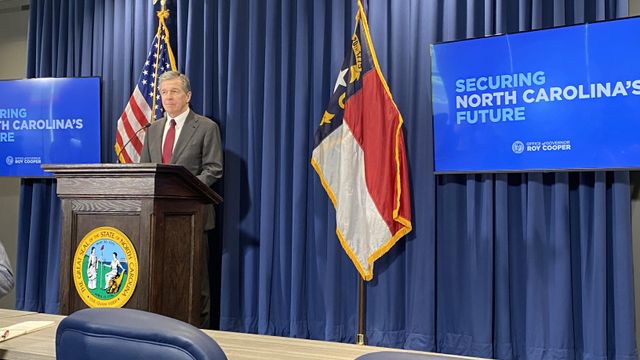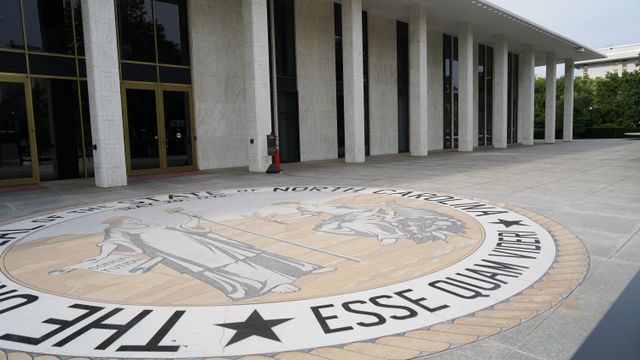Cooper: GOP is 'trying to choke' public schools, calls for higher teacher pay, end to vouchers
Democratic North Carolina Gov. Roy Cooper drew sharp contrasts with Republican lawmakers in his last budget proposal, calling on legislators to stop cutting taxes for high-income owners and pullback on spending programs for private schools.
"They can choose desperately needed investments to educate our children and our workforce, along with tax cuts for the middle class and small businesses, or they can choose tax giveaways for corporations and the wealthy and keep robbing taxpayer money from public schools to fund private school vouchers," Cooper said of the state's Republican-controlled legislature.
Cooper's proposal amounts to a wish list and it's not certain any of his priorities will be funded.
Republicans have veto-proof super majorities in the state House and Senate, enabling the GOP to pass their priorities without Cooper having any real say in the process. But his spending preferences offer a glimpse into Democratic priorities for the state.
"It's always spend more, tax more," said Senate leader Phil Berger, R-Rockingham County. "When the Democrats were in control of the General Assembly that was their proposal, and we see where it got us. I can tell you that we do not intend to go down that path."
The state is expected to have a $1 billion budget surplus in the fiscal year beginning in July. Lawmakers passed a two-year budget last year, but return to Raleigh for this year's "short session" to make adjustments rather than wholesale changes to the budget.
Cooper said his budget does not raise taxes on anyone and includes tax cuts on the first $200,000 of individual income.
House Speaker Tim Moore, R-Cleveland County, said previously that lawmakers plan to add $300 million in funding for private school vouchers called Opportunity Scholarships. Last year, lawmakers lifted any income eligibility cap on the program that refunds parents for tuition paid to private schools. The program ran out of money before paying out to all income levels.
Berger said he wants to see the gap fully funded.
"Whether intentional or not, the Republican legislature is trying to choke the life out of public schools and then accuse them of failing while they gasp for breath," Cooper said.
Cooper called for:
- Spending $745 million on child care and early education, including an additional year of child care stabilization grants. He said corporate executives are not as concerned with reducing personal income and corporate tax rates as they are with finding educated workers and ensuring those workers do not have to leave the workforce due to child care availability or quality.
- At least 5% raises for all state government workers, which includes non-certified staff at public schools. The budget proposes retention bonuses for state workers. Nearly one-third of all first-year state workers left their job in 2023 and the vacancy rate at state agencies is nearly double what it was before the pandemic.
- Changes to the state's Unemployment Insurance Trust Fund, which is at a record-high of $4.4 billion and businesses are paying in more than three times the claims that are being paid out. His proposal calls for a reduced tax on small businesses, higher weekly benefits for the unemployed and an increase in the maximum duration of benefits during a recession. State Budget Director Kristen Walker said the trust fund would continue to grow even if all of Cooper's plans were implemented.
- A $2.5-billion general obligation bond to be put on the November ballot for school construction. The money would go toward the construction of approximately 90 new elementary and middle schools and would not increase the state's debt service.
- An 8.5% raise for teachers plus a $1,500 retention bonus. "This will lift our starting teacher pay to first in the Southeast," Cooper said, noting that North Carolina now ranks 46th nationally in beginner teacher pay.
"We won’t stay first in business if we become last in education," said Cooper, who is in his last term and not running for reelection due to term limits.
Cooper has been in office since 2017 and this budget is the first to not include Medicaid expansion. Cooper and state lawmakers agreed to a plan to expand Medicaid across the state last year.
The budget proposal does not include revenue from the legalization of video lottery terminals or video gaming terminals. The state legalized mobile sports gambling last year and it launched in March. Republicans lawmakers have said they will consider legalizing additional gaming.
"I would say that there may be some things there that we can work with," Berger said. "There are probably a lot of things that we won't be able to work with. We are going to, I anticipate, work on budget adjustments that will keep us within a growth factor that recognizes population growth and inflation. In order to do that, I don't know that we can go as far as what the governor is talking about."
North Carolina has a personal income tax rate of 4.5 percent and a corporate tax rate of 2.5 percent. In 2025, the personal rate drops to 4.25% and to 3.99% after 2025. It could drop further if the state meets certain revenue thresholds. The corporate rate will fall to 0% in future years. The reduction in tax rates has been a Republican priority for years and one of lawmakers' top victories since taking control of both chambers in 2011.
"We should choose the right direction that secures a future for the third-fastest growing state in the country, a state that is on target to become the seventh-most populous state in less than a decade," Cooper said. "We are at a crossroads. One path prioritizes giveaways to the wealthy over the well being of our state. The other secures a future of success for everyone."











